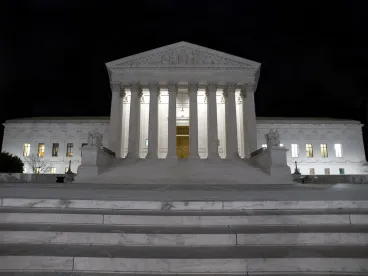On May 7, 2020, the Supreme Court of the United States decided Kelly v. United States, No. 18-1059, holding that for purposes of the federal wire fraud or federal-program fraud statutes, there can be no criminal violation absent intent to obtain “money or property.”
In September 2013, then-New Jersey Governor Chris Christie’s Deputy Chief of Staff Bridget Anne Kelly and Port Authority Executive Director William Baroni, along with officials of the Port Authority of New York and New Jersey, shut down toll plaza access lanes on the George Washington Bridge into Manhattan normally heavily occupied by commuters from Fort Lee, New Jersey. Kelly communicated that she wanted to “‘creat[e] a traffic jam that would punish’” Fort Lee’s Democratic mayor and “‘send him a message’” because he had refused to back Governor Christie’s reelection campaign. After four days of heavy traffic, the scheme was discovered and was popularly dubbed the “Bridgegate” scandal.
Kelly and Baroni were charged with and convicted of committing federal wire fraud (18 U.S.C. § 1343), fraud upon a federally funded program or entity (18 U.S.C. § 666(a)(1)(A)), and conspiracy to commit those crimes. The Third Circuit Court of Appeals affirmed the convictions, and a unanimous Supreme Court reversed.
The Court held that the government “needed to prove property fraud.” That is, an intent to obtain money or property from the victim consistent with the language of the federal wire fraud statute, which makes it a crime to effect “any scheme or artifice to defraud, or for obtaining money or property by means of false or fraudulent pretenses, representations, or promises,” and the federal program fraud statute, which makes it a crime to obtain “by fraud” the “property” of a federally funded program or entity.
Under the Court’s 1987 decision in McNally v. United States, these requirements prevent “these statutes from criminalizing all acts of dishonesty by state and local officials.” Accordingly, “federal fraud law leaves much public corruption to the States (or their electorates) to rectify.”
Here, the Court found no property-based intent. Specifically, the change in lane allocation was determined to be an abuse of the “regulatory powers” of “allocation, exclusion, and control” of governmental property, rather than a scheme to “appropriate the government’s property” outright. Likewise, the fact that this scheme also resulted in certain personnel reallocation (such that a toll booth operator was literally paid to be “on call” for the single remaining Fort Lee lane) would not support the fraud convictions, as depriving the government of such employee wages was not the “object of the fraud.”
Where the sole object of the Bridgegate scheme was “political payback,” Kelly and Baroni could not be convicted of fraud as a federal crime.
Justice Kagan wrote the opinion for a unanimous Court.






 />i
/>i
